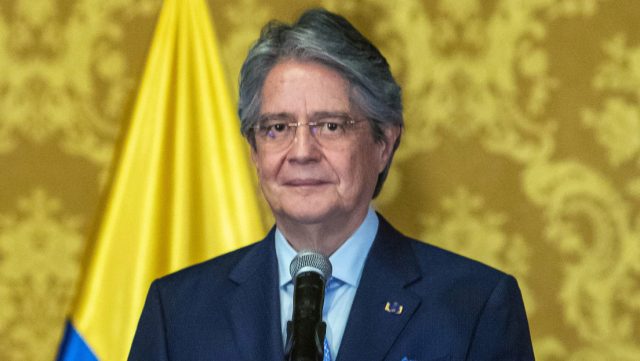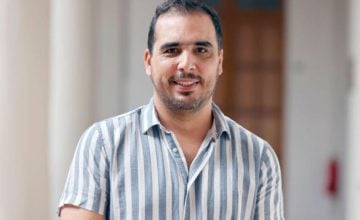The president of Ecuador, Guillermo Lasso, partially vetoed the bill that allows the interruption of a pregnancy in case of rape in the South American country, approved by the National Assembly on February 17.
The approval of this project in Parliament came after the Ecuadorian Constitutional Court (CC) decriminalized abortion in cases of rape in April 2021, explains journalist Edgar Romero for RT.
«I have decided to include observations on to the bill with the aim that it be in absolute agreement with the opinion of the CC», Lasso said in a statement issued Tuesday night.
The president of Ecuador justified his veto in that «there are clear provisions in the sentence (of the CC) that have not been complied with by the Assembly» or that «are not consistent» with the Ecuadorian legal framework.
The objections presented by the president of Ecuador include 61 alternative texts, according to what he says in the statement.
The ‘observations’ in Ecuador
Lasso, who has repeatedly indicated that he defends life «from conception to natural death», made observations regarding the maximum term to carry out the procedure of termination of pregnancy, the requirements to access abortion and the conscientious objection of health professionals.* Time limits
In relation to the time limits to carry out an abortion, the bill approved in Parliament established that it is a maximum of 12 weeks for adult women and 18 weeks for girls, adolescents, women in rural areas and indigeous peoples; while for rape victims with mental disabilities «the best medical practices will be observed and complied with».
The plenary made the exception in the case of girls, adolescents, women in rural areas and indigenous peoples when considering their «special characteristics» and «because they deserve priority attention by the State».
In his veto, the president requested that the terms be unified in 12 weeks, «both for cases of the rural sector and the urban sector». He argued that «establishing differences between citizens based on places of birth or conditions of origin» would be contrary to the principle of equality established in the Constitution.
* Requirements
Regarding the requirements to carry out the process, the bill establishes that rape victims only have to fill out a form, once they receive information about the process to carry out the termination of pregnancy, to give their consent.
“Under no circumstances will any prior complaint, examination or statement be required from the girl, adolescent, woman or pregnant person who wishes to interrupt her pregnancy as a result of rape”, says the bill.
Lasso considers that the Parliament practically «has omitted» to establish requirements to access the abortion procedure, as established by the ruling of the Constitutional Court.
«Therefore, in my objections, I have included requirements that will bring the legal body compliance with the Court’s judgment», he says.
The president proposes that the interruption of pregnancy can be done only when at least one of these three requirements is met:
1. That the victim or whoever knew of the fact has filed a complaint for the investigation of the crime of rape, except in the case of women with mental disabilities.
2. Have the victim sign an affidavit. In the case of minors, this can be signed by their legal representative.
3. That a treating physician or legal practitioner perform a health examination in which, under oath, it is certified that there are indications of a violation.
* Conscientious objection
The project approved by the Ecuadorian Parliament establishes, with respect to the rights of health personnel who intervene directly in the procedure of the interruption of a pregnancy, that conscientious objection «is a personal, very personal right» and that «the objection of collective or institutional consciousness» is not possible.
However, Lasso considers that conscientious objection was not fully developed in the text.
«Unfortunately, the Assembly project has openly ignored this right, which is why I have been forced to include articles that guarantee all health professionals the application of this constitutional principle», he says.
In his proposals, the president leaves the door open so that private health institutions can claim conscientious objection institutionally, refusing to provide legal abortion care to women victims of rape.
Specifically, his veto indicates, among the prohibitions of health personnel: the right to «claim conscientious objection in an institutional way, when it comes to State hospitals»; while in the rights of health personnel it establishes: «Conscientious objection to the practice of consented abortion in cases of rape, personally, collectively or institutionally, in the latter case with the exception of public hospitals».
* From guarantee to regulation
President Lasso even proposes changing the name of the regulation. The project approved in the National Assembly was called the Organic Law that Guarantees the Voluntary Interruption of Pregnancy for Girls, Adolescents and Women in Case of Rape.
However, the president points out that the ruling of the Constitutional Court uses the verb to regulate and not to guarantee; Therefore, he proposes that the project be an Organic Law that Regulates the Voluntary Interruption of Pregnancy for Girls, Adolescents and Women in Case of Rape.
Along the same lines, he makes changes to article 1 of the regulations. The approved text says that the purpose of the law is «to guarantee, protect and regulate the right of women, girls, adolescents and pregnant people to the voluntary interruption of their pregnancy in cases of rape».
In this regard, the president proposes that it say that this law aims to «generate an appropriate regulatory framework that regulates consented abortion in the event of rape, subject to human dignity and the full exercise of rights, without undermining the constitutional protection to life from conception».
Throughout the veto document, the president insists that abortion is not a right, but an exception.
What happens now?
Now the bill will return to the National Assembly in Ecuador, which has a period of 30 days to decide whether to maintain the original text or accept the proposal of the President of the Republic.
Some conservative organizations, such as Familia Ecuador, expected a total veto of the president to the regulation and even carried out a collection of signatures to pressure in that direction, reaching almost 44,000 signatories.
For their part, feminist groups and groups in favor of abortion, although they consider that this bill is an important step, demand «a fair and restorative law», which does not contemplate time limits or requirements.
Regarding the presidential veto, from Surkuna, one of these organizations points out that «it changes the object of the law», since it does not seek to «guarantee access» to abortion, but rather to «obstruct it».
From the Ecuadorian Center for the Promotion and Action of Women (Cepam) Guayaquil rejected the veto, considering that the presidential measure «sends a clear message against the right to a life project and the rights of victims and survivors in case of rape».











